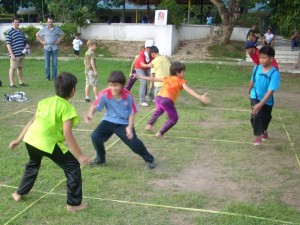Playing Patintero in the West Philippine Sea

Instead of agawan base, Malacañang should probably play a different Filipino street game: Patintero.
SAN FRANCISCO — My last column on the West Philippine Sea dispute predictably drew strong reactions.
Some saw the piece as defending Beijing. Others got the point. It wasn’t a defense of the regime to the north. It acknowledged the threat – but argued that Manila has to be smart in defining what that threat is — and in its response.
As I noted, a big mistake would be to frame the conflict, even unintentionally, as a battle between Filipinos and Chinese. That would be wrong morally and politically.
I know it’s hard to resist that game, especially amid vocal Beijing cheerleaders (including a few who apparently liked my last column) expressing not-so-subtle views of the Chinese as some kind of master race destined to dominate the world.
But I’m willing to bet that it’s not a view shared by most Chinese, in the same way that most Filipinos probably reject the many twisted biases of Pinoys against the Chinese.
The other big mistake would be to frame a response in purely military terms. That’s not happening – yet. Though, the temptation is clearly there based on the pronouncements of many Filipino politicians.
Yes, an island nation needs a modern, even powerful, navy and coast guard. There are serious threats to deal with within the archipelago. But getting obsessed with military hardware and with having bigger, faster gunboats and more powerful weapons would be an error.
This will be a long dispute. Diplomacy (including quiet, behind-the-scene diplomacy) will be the key element of any effective strategy.
Could there be a military component? Of course.
In fact, I sure hope the Philippine military already has a contingency plan — and that Priority No. 1 is defending the civilians in the affected areas and getting them out as fast as possible in case war breaks out.
Now this may sound strange to some, but I actually think there are lessons from the Filipino street games I (and I suspect many others) used to enjoy playing while growing up in Manila.
The problem in my view is that, in the recent flare-up, Malacañang chose to play agawan base.
For those who aren’t familiar, the game goes like this. You have two teams, each with a base, usually a telephone pole or a neighbor’s gate.
The objective is to capture the other team’s base by tagging it. To do this, you tag and capture as many of the opposing players until their base becomes weak enough to attack.
The game typically involves baiting an opposing player to chase you and to be fast enough to return to your home base so another team member can then give chase and tag your pursuer.
It’s a game of speed and most important of all, smart tactics. It’s a game that Beijing played brilliantly at Scarborough Shoals by having its navy gunboat standing by, ready to pounce when the Philippine Navy arrested those fishermen.
Instead of agawan base, Malacañang should probably play a different Filipino street game: Patintero.
Again for those who aren’t familiar it goes like this: You have two teams and a rectangular playing area.
The rectangle is divided into smaller rectangles. The objective is for one team to cross to one end and then back. The opposing team must prevent that by moving quickly along the lines of the playing area, and tagging the other team’s members.
Again, it’s a game of speed and smart tactics.
The dumbest thing a defending team can do is to have each player randomly and aimlessly try to tag members of the opposing team. For the advancing team can simply threaten a defender on opposite ends of his area, and then seize an opening when that defender overreaches or gets distracted.
Which is why a classic defense tactic is to simply let an opponent into an area where, in coordination with other team members, a defending team can keep their opponents bottled up.
It’s a game where patience is important. You become impatient or arrogant, you lose. Unity and coordination are critical.
Unity is also important in the West Philippine Sea dispute, and for the Philippines that means uniting with other small nations feeling pressure from Beijing — or worried about where the rising tensions in the region could lead.
Malacañang has made it clear that it is pushing for a regional response. But as the recent disappointment at the ASEAN meeting shows, that’s easier said than done. It’s a challenge and will take time and patience. But clearly, it’s achievable, especially with the growing concern over Beijing’s muscle flexing in the region.
The hope, of course, is that the dispute is resolved peacefully, with China being part of the unity equation. The big risk is that this whole mess can spin out of control in which blind nationalist chauvinism becomes the dominant theme.
Unfortunately, those currently calling the shots in this dispute probably don’t care much about that. This bunch includes the militarists and defense bureaucrats salivating over the prospect of bigger budgets and battlefield glory, and maybe even the arms manufacturers eyeing hefty profits that would surely come with war.
Like I’ve said, this isn’t about the Filipinos versus the Chinese.
For I suspect that, like the Chinese and Filipino fishermen who managed to get along for decades in the disputed waters before the macho-posturing heated up, most Chinese and Filipinos would rather have their children play with each other in the streets and playgrounds of Beijing and Shanghai, Manila and Cebu — rather than kill each other in the open sea.
On Twitter @KuwentoPimentel. On Facebook at www.facebook.com/benjamin.pimentel














